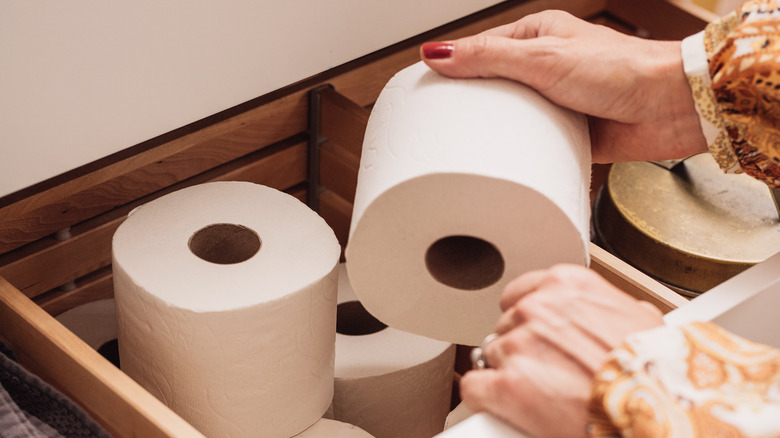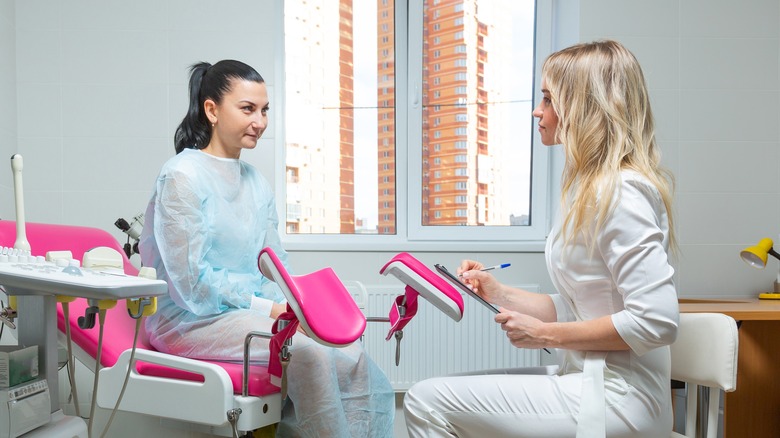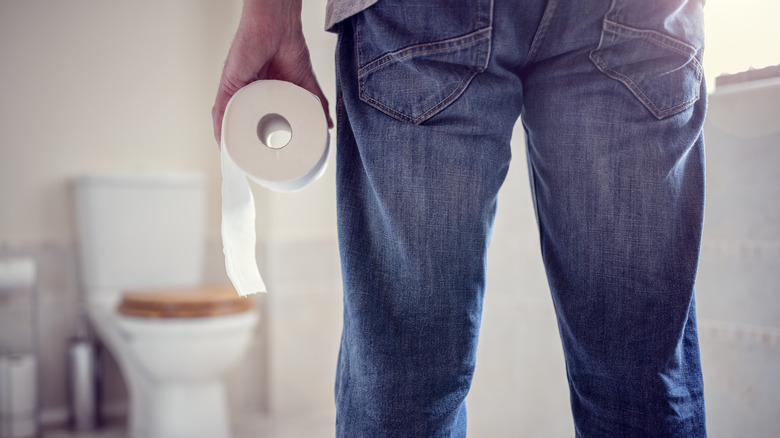The Biggest Risks Of Wiping Wrong
You might have seen the viral TikTok showing a teacher demonstrating with balloons how to wipe from front to back. It got you thinking. Are you wiping your butt wrong? You might not think too much about how to wipe, but doing it properly is pivotal to avoiding potential diseases and infections.
Both men and women can succumb to a urinary tract infection from wiping from back to front. This is due to bacteria entering the urethra. It can even go further and reach the kidneys. Women are also susceptible to bacterial infection within their vaginas due to rectal bacteria being wiped into the vagina. It can also climb up the vagina and wreak havoc on the delicate female reproductive system.
Some significant risks can come from wiping from the back to the front. We'll explore just a few infections that you can experience from wiping wrong. You'll also learn why it's essential to be gentle when wiping.
Bacteria from improper wiping can cause a UTI
Wiping might not seem that important of a task, but things are in pretty close quarters. So, you can spread bacteria where they don't belong if you wipe from the back to the front, especially if you have a vulva. It's less common with a penis, but a urinary tract infection (UTI) can happen. According to the Centers for Disease Control and Prevention (CDC), a UTI occurs when bacteria enter the urethra.
Once the bacteria have made a home in the bladder, they wreak havoc by causing painful burning, unproductive urges to urinate, frequent urinating, and even blood in your urine. The infection can also cause pain in your abdomen or your back. Severe infections include UTI symptoms you shouldn't ignore, like fever, chills, and nausea.
While men can get a UTI, it's more common in females, with about 20% of females getting a UTI at some point in their lives, per Cleveland Clinic. This is due to the closeness to the urethra and rectum, along with the fact that females have shorter urethras.
One of the best ways to prevent a UTI is to wipe from front to back. It also helps to stay hydrated. The CDC further recommends not douching or spraying the genital area.
Treatment for a UTI requires antibiotics. While UTIs in the bladder are the most common, untreated UTIs can also cause a kidney infection.
UTI can lead to a kidney infection
Bacteria don't just stop in the bladder. Sometimes the bacteria from wiping from back to front can go from the bladder into the kidneys.
A kidney infection will have most of the same symptoms as a UTI, like feeling like you have to urinate but not being able to go and burning when you pee, but you'll also have infection symptoms like fever and chills. Since the kidneys are located in the lower back, it can be painful. According to NHS, it's also a type of pain that doesn't let up.
When an infection has reached the kidney level, you must get treatment from your healthcare professional ASAP. A kidney infection will clear up quickly with proper treatment, and you'll start feeling better. Kidney infections can get dangerous quickly and lead to kidney damage and blood poisoning (per Mayo Clinic).
Wiping wrong will raise your risk of getting a kidney infection. Still, other risk factors listed by Mayo Clinic include having female anatomy, bladder nerve damage, a weakened immune system, and a catheter, among others.
Your bladder and kidneys are significant areas affected when bacteria from your vagina or rectum enter the urethra. However, bacteria from the rectum can also enter the vagina, causing a very different bacterial infection.
Bacteria entering the vagina can cause bacterial vaginitis
The vagina is close to the rectum; therefore, wiping from back to front can lead to bacteria from the rectum finding its way into the vagina. The vagina is full of bacteria and yeast that keep a delicate balance, explains The American College of Obstetricians and Gynecologists (ACOG). When that balance is thrown off, it causes the lining to become inflamed and irritated, leading to burning, itching, discharge, and foul odor. However, MedlinePlus also notes that you might experience an infection without symptoms.
Typically, you'll need to see a healthcare professional to become diagnosed with bacterial vaginitis and be given antibiotics. These can either be taken by mouth, or cream might be prescribed (via MedlinePlus). It's also important to note that vaginitis can increase the risk of getting a sexually transmitted disease. Prevention is typically the best medicine for a bacterial infection of the vagina, so it's important to wipe from front to back. The ACOG also recommends cleaning the area with plain water rather than using feminine sprays or douches.
Bacterial vaginitis needs to be diagnosed by a healthcare professional, and a sample will be taken to help ensure that the infection isn't something more severe like pelvic inflammatory disease (PID). While PID is a rarer condition that may result from improper wiping, it's essential to learn the signs and symptoms.
Improper wiping can cause pelvic inflammatory disease
Vaginitis can cause some irritating and painful symptoms in females. And, much like a UTI, it can be caused by constant improper hygiene techniques and can progress to become a more serious infection. This condition, called pelvic inflammatory disease (PID), goes beyond the vagina or vulva to affect the female organs like the cervix, uterus, fallopian tubes, and ovaries (via Healthline).
The Office of Women's Health notes that 88,000 women were affected with PID in 2013. And, while PID is more typically caused by bacteria from sexually transmitted diseases (STDs), it can also be caused by normal bacteria that move up into the vagina.
This condition generally gives you a few telltale symptoms beyond pain, like painful urination, fever, irregular bleeding, and foul vaginal discharge. It can also lead to fever and vomiting when severe.
Like most bacteria infections, it requires medical attention to get the proper treatment. You'll want treatment immediately due to the irreversible damage PID can cause to the female organs. The CDC notes that 1 in 8 women experienced difficulties getting pregnant after PID infections.
Since most PID is due to STDs, it's essential to practice safe sex and know everything you can about STDs. Wiping in the proper direction can also save you serious complications.
Most of the conditions we've discussed so far affect mainly women. However, how hard you wipe can also create issues in both men and women.
Hard wiping can create tears and fissures
Wiping from front to back can save you from moving bacteria to where it shouldn't be. You also want to be gentle when you wipe. Dr. Evan Goldstein, a rectal surgeon in New York City, told Insider that wiping too hard can cause anal fissures and tears. Most people are in a hurry to wipe and go, meaning they are a bit too rough with the delicate area. Trying to clean everything leads to a harsh rubbing motion, but Dr. Goldstein recommends patting to clean the area.
A rough scrubbing motion can also irritate swollen veins in the anus, known as hemorrhoids. Gynecologist Dr. Alyssa Dweck stated in Health that using a bidet, sitz bath, or peri bottles might be better to clean the anus rather than wiping it with rough toilet paper. This allows you to use the water to clean the area and then pat it dry. Pay attention to the toilet paper you're using; make sure it's not too harsh for your skin.
The way you wipe can lead to issues like bacteria where it shouldn't be, which is why it's so important to wipe from front to back. You'll also want to ensure you're not using too much pressure or rubbing the area too rough. Wiping correctly helps you to avoid issues later on.






